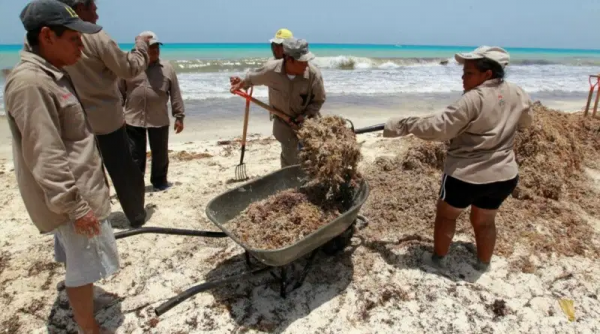Progreso, Yucatan, (June 04, 2021).- Saúl is a fisherman in Progreso, a port located 30 minutes north of Mérida, Yucatán.
Every morning when he goes fishing, he makes his way in the sand to introduce his boat into the sea, the sargassum can sink it, so he does not leave it in the sheltered ports and does it on the coast where there are not so many algae.
“Imagine fighting with sargassum, you want to walk on it but you cannot because you sink, it is like walking in the snow, we do this, so that makes things harder for us to go out fishing,” said Saúl.
Fishermen have implemented cleaning operations because sargassum can damage their engines and fishing gear.
“Sargassum can damage the boat’s engine and these engines are very expensive. We need our boats and engines in good condition to go out fishing, but this situation is making everything more difficult”, stated Guillermo May, another fisherman from Progreso.
“Small boats have to be removed, because they can sink with sargassum”, Saúl Pérez added.
Tons of sargassum landed in Yucatán, all the way from the Port of Sisal to the Port of Dzilam de Bravo, a 170-kilometer coastline.
This sargassum is not the same that reaches the coasts of Quintana Roo, which this year have registered massive concentrations.
According to the Yucatan authorities, the sargassum that landed on the 330 kilometers of Yucatecan coasts is of another species, a product of the detachment of algae from the depths to the north of the Peninsula.
“In the case of our neighbors in Quintana Roo, it is the species of ” Sargassum” brought by intercontinental currents. When the strong winds from the north come, a certain amount of sargassum is released from the bottom of the ocean and it is the one that comes up, it is not the sargassum that comes from Quintana Roo ”, Sayda Rodríguez. Secretary of Sustainable development of Yucatán.
Service providers, residents, fishermen and authorities extract sargassum every day, collect it and take it to special dumps.
“I think that visually it is not pretty, in addition to the foul smell it produces when it accumulates that obviously does not invite you to go to the beach because the beach is supposed to be beautiful,” concluded Catalina Gutiérrez. Testimony.
In 2020, 85 thousand cubic meters of sargassum were collected in Yucatan, so far this year there are still no indicators of the volume that landed, but it is estimated around 22 thousand cubic meters.



